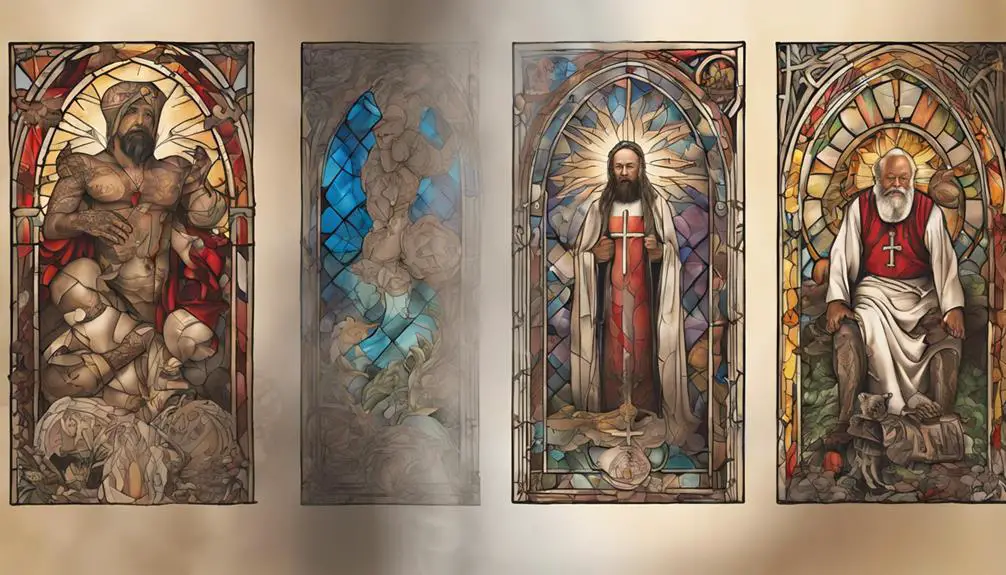Breaking down Leviticus 19:28, we delve into the Bible's perspective on tattoos; is it an age-old condemnation or a misunderstood verse?

What Bible Verse Talks About Tattoos
Did you know that nearly 30% of Americans have at least one tattoo? While tattoos are becoming more accepted socially, there's a verse in the Bible, Leviticus 19:28, that appears to denounce the practice.
As you explore this verse, you may find yourself asking if this interpretation holds true in today's context. Does this verse truly condemn tattoos, or is there more to it?
Let's unpack this intriguing topic further.
Key Takeaways
- Leviticus 19:28 in the Bible talks about tattoos, specifically prohibiting body modifications for the dead.
- The verse is part of the Holiness Code, aiming to distinguish Israelites from pagan practices.
- The term 'tattoo' in Leviticus 19:28 is of uncertain meaning, encompassing any deliberate body alteration.
- Interpretation of Leviticus 19:28 in modern Christianity varies, with views on tattoos ranging from prohibition to acceptance.
Understanding Leviticus 19:28

To fully grasp the biblical stance on tattoos, you must first delve into the specific verse of Leviticus 19:28, which has been widely interpreted and debated over centuries. This verse states, 'You shan't make any cuts on your body for the dead or tattoo yourselves: I'm the Lord.' The verse's straightforward language leaves little room for ambiguity, yet its interpretation has been a point of contention.
The key to understanding this verse lies in the contextual nuances of the original Hebrew texts. The term 'tattoo' in this verse is translated from the Hebrew word 'qa'aqa', which scholars argue holds a broader meaning, encompassing any form of body modification. This interpretation suggests a prohibition not just on tattoos, but on any deliberate alteration of the body's natural state.
Further, the phrase 'for the dead' indicates that these body modifications were associated with pagan mourning rituals, hinting at a specific cultural context. You need to consider these linguistic and cultural nuances to comprehend the verse fully. Doing so will equip you with a more nuanced perspective on the biblical view of tattoos.
Context of Leviticus in Bible

Delving into the context of Leviticus in the Bible, you'll find that this book is part of the Pentateuch, the first five books traditionally attributed to Moses, and it plays a significant role in outlining the ceremonial, legal, and moral practices for the Israelites. It's primarily a handbook for Israel's priests and a guide for Israel's worship and ethical practices.
Interestingly, Leviticus is positioned at the heart of these five books, emphasizing its importance in the formation of Israel's identity. It's abundant with laws and instructions, many of which may seem peculiar to modern readers. However, these laws served a vital purpose in setting the Israelites apart from surrounding cultures, reinforcing their unique relationship with God.
The laws in Leviticus addressed a wide range of topics, from dietary restrictions to rules about clothing and personal grooming, including those concerning tattoos. It's essential to remember that these laws were given in a specific historical and cultural context, with the primary aim of fostering holiness and obedience among God's people. Understanding this context is crucial for interpreting the laws appropriately and in a balanced way, including those on tattoos.
Interpreting Leviticus 19:28

When you examine Leviticus 19:28, a verse often cited in discussions about tattoos, it's crucial to interpret it in its original context and understand its deeper implications. This verse reads: 'You shan't make any cuts on your body for the dead or tattoo yourselves: I'm the Lord.' Many interpret this as a clear prohibition against tattoos. However, is it that straightforward?
In its original context, Leviticus is part of the Holiness Code aimed at distinguishing the Israelites from their pagan neighbors. The practices it condemns, including marking one's body, were associated with pagan rituals and mourning customs. The focus wasn't on tattoos per se, but on the Israelites' identity and relationship with God.
There's also linguistic considerations. The Hebrew word translated as 'tattoo' in this verse is 'qa'aqa', which only appears once in the entire Bible. Its exact meaning is unknown, leading to differing translations and interpretations.
Tattoos and Modern Christianity

In the realm of modern Christianity, the perspective on tattoos varies greatly, reflecting diverse interpretations of biblical teachings and cultural norms. You'll find that some Christians fully embrace tattoos as a form of personal expression, while others strongly oppose them, citing Leviticus 19:28. This dichotomy highlights the challenge of navigating contemporary issues through an ancient text.
Tattoos, once associated with rebellion, have found a place within the church as well. You may come across believers who use tattoos as a means of evangelism, or as reminders of their faith journey. They don't see tattoos as contradicting their faith, but as enhancing it.
Nevertheless, there's a large section of modern Christianity that views tattoos as a desecration of the body, which they believe should be a 'temple of the Holy Spirit', as mentioned in 1 Corinthians 6:19-20. They argue that permanent body markings aren't in line with this biblical instruction.
Therefore, it's clear that the issue of tattoos within modern Christianity isn't black and white. It's a complex discussion, influenced by interpretation, tradition, and personal conviction. As a believer, it's up to you to study the scriptures, seek counsel, and make your own informed decision.
Different Christian Perspectives on Tattoos

Exploring the mosaic of Christian perspectives on tattoos reveals a fascinating intersection of faith, personal conviction, and cultural adaptation. You'll find a spectrum of views that range from absolute prohibition to full acceptance.
On one end, there are conservative Christian denominations that cite Leviticus 19:28, interpreting it as a clear divine ban on tattoos. They believe that the body is a temple of the Holy Spirit and shouldn't be marked or altered in any way. This perspective perceives tattoos as a form of self-defilement.
On the other end, you'll encounter progressive Christians who view tattoos as a form of personal expression, art, or even faith proclamation. They argue that the Leviticus command was meant for a specific cultural context that doesn't apply today. For them, tattoos can serve as visual testimonies, living sermons inked on skin.
In between, there are moderate Christians who may see tattoos as permissible but not necessarily beneficial, applying the Pauline principle from 1 Corinthians 10:23. They might caution against tattoos that could cause offense or misunderstanding.
In essence, Christian perspectives on tattoos aren't monolithic. They reflect diverse interpretations, cultural adaptations, and personal convictions within the faith community.
Conclusion
In conclusion, you'll find the Bible speaks on tattoos in Leviticus 19:28. The verse's interpretation, however, varies among Christians, largely due to differing cultural contexts and theological perspectives.
Modern Christianity has diverse views on tattoos, with some seeing them as expressions of faith. Navigating this issue requires an analytical approach, respecting the importance of personal conviction and cultural sensitivity.
Remember, the Bible encourages Christians to discern what's pleasing to God.



Sign up